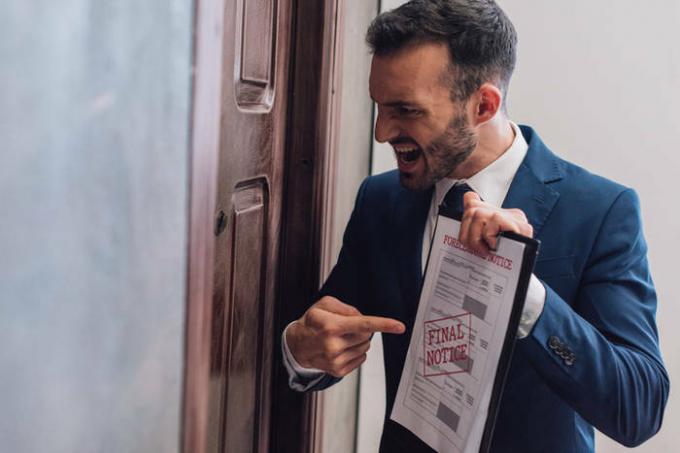An experiment is being conducted in five regions of Ukraine. The police got the right to stop drivers-debtors and take their car from them for communal debts, alimony and fines
Original sanctions have been applied to Ukrainians who evade paying utility bills, alimony payments, fines and other mandatory payments. Now the police can stop such a "evader" on the road and demand from him to pay the entire amount of the debt on the spot. If the debtor refuses to pay, the car is confiscated from him. Like this: I rode out on a "horse" and returned home on foot. So far, this project has been launched in five regions of Ukraine, but in which it is kept in the strictest confidence. We tried to understand how the innovation works, and found out where there are already the first defaulters caught.
Joint project of executors and police

Previously, the executive service visited debtors / istockphoto.com
It is not so easy to "knock out" debts from a malicious defaulter in our country. First, a certain amount must be accumulated, then the debtor is sued. The court decides on the compulsory collection of money, and the data is transferred to the State Executive Service (GIS). After that, the GIS can visit the debtor for years and kiss the closed doors.
This year, they decided to take the defaulters seriously. In the summer, the executive service gained access to all bank accounts of Ukrainians, and now can write off debts from there automatically - as they say, without declaring war. And since the beginning of last week, GIS has teamed up with the National Police: from now on, performers can track debtors' cars on the roads of the country in real time.
The executive service was given access to surveillance cameras of the Safe City system (this system is now installed in all major cities and on the main highways of Ukraine). As soon as the GIS employees notice the debtor's car, they immediately transmit the information with the coordinates to the National Police, and they stop the car literally a couple of kilometers after getting into the camera's view. The debtor is immediately offered to pay the amount of the debt. True, not in cash, but by transferring to the account. Those who refuse are facing the confiscation of the car. You can pick it up only after the full repayment of the debt.
Now a joint project of GIS and the National Police operates in five regions of Ukraine. However, it has already shown its extraordinary effectiveness. In just a few days, it was possible to collect 64 thousand from the drivers. UAH alimony, 39 thous. UAH in taxes and 17 thousand. UAH fines for traffic violations. At the same time, only two cars were seized. “Many debtors, after being stopped by employees of the National Police, and when it comes to the confiscation of vehicles on account of debt, willingly they agree to pay it in money, if only they do not take the car, "- explained to reporters the Deputy Minister of Justice for GIS Andriy Gaichenko.
Car confiscation: who should be afraid

Debt collection on the road is possible only by a court decision / istockphoto.com
In which regions of the country the system of "road" debt collection works is not named for obvious reasons. Thanks to the secrecy, GIS wants to discipline all debtors in Ukraine, and hopes that on pain of confiscation of the car, they will pay their debt voluntarily. However, Andrei Gaichenko warns that every week one or another large city is connected to the project, and by the end of the year, the cooperation of the GIS with the National Police will spread throughout the country.
The media is already leaking information about the first "victims" of the new project. So, for example, in the Nikolaev region, Daewoo Lanos was arrested from a man who owed 17 thousand rubles for the heating network. hrn. There is information that Kiev and Kharkov are connected to the project. And yesterday, the Ministry of Justice of Ukraine reported on its Facebook page about the detention of a car defaulter of alimony in Odessa.
At the same time, Andriy Gaychenko emphasizes that the police can only stop debtors in cases where there is a court decision on the compulsory collection of the debt. “Without a court decision, which came into legal force, the GIS authorities do not collect debts for a communal apartment. The overwhelming majority of debtors in housing and communal services, and this is 99 out of 100, do not have such court decisions. Therefore, they have nothing to fear, ”the Deputy Minister of Justice wrote on his Facebook page.
You will also be interested to read:
What if the car is picked up by a tow truck?
What if circumstances force you to violate traffic rules?




